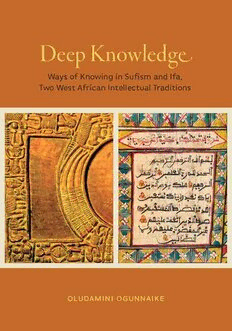Table Of ContentDeep Knowledge
Ways of Knowing in Sufism and Ifa,
Two West African Intellectual Traditions
Oludamini Ogunnaike
Deep Knowledge
AFRICANA RELIGIONS
Edited by
Sylvester A. Johnson, Virginia Tech
Advisory Board:
Afe Adogame, Princeton Theological Seminary
Sylviane Diouf, Historian of the African Diaspora
Paul C. Johnson, University of Michigan
Elizabeth Pérez, University of California, Santa Barbara
Elisha P. Renne, University of Michigan
Judith Weisenfeld, Princeton University
Adopting a global vision for the study of Black religions, the
Africana Religions book series explores the rich diversity of reli-
gious history and life among African and African-descended
people. It publishes research on African-derived religions of
Orisha devotion, Christianity, Islam, and other religious tradi-
tions that are part of the Africana world. The series emphasizes
the translocal nature of Africana religions across national,
regional, and hemispheric boundaries.
Deep Knowledge
Ways of Knowing in Sufism and Ifa,
Two West African Intellectual Traditions
Oludamini Ogunnaike
The Pennsylvania State University Press
University Park, Pennsylvania
This book is freely available in an open access edition with the generous support
of The Pennsylvania State University Libraries. Digital copies are available for
download through the Pennsylvania State University Press website.
Library of Congress Cataloging-in-Publication Data
Names: Ogunnaike, Oludamini, author.
Title: Deep knowledge : ways of knowing in Sufism and Ifa, two west African
intellectual traditions / Oludamini Ogunnaike.
Other titles: Africana religions.
Description: University Park, Pennsylvania : The Pennsylvania State University
Press, [2020] | Series: Africana religions | Includes bibliographical refer-
ences and index.
Summary: “Studies the epistemologies of two of the most influential intellec-
tual/spiritual traditions of West Africa: Tijani Sufism and Ifa”—Provided
by publisher.
Identifiers: LCCN 2020036971 | ISBN 9780271086903 (hardback)
Subjects: LCSH: Tijānīyah—Africa, West. | Ifa (Religion)—Africa, West. |
Knowledge, Theory of (Religion)
Classification: LCC BP189.7.T5 O47 2020 | DDC 297.40966—dc23
LC record available at https://lccn.loc.gov/2020036971
Copyright © 2020 Oludamini Ogunnaike
All rights reserved
Printed in the United States of America
Published by The Pennsylvania State University Press,
University Park, PA 16802–1003
The Pennsylvania State University Press is a member of the Association of
University Presses.
It is the policy of The Pennsylvania State University Press to use acid-free
paper. Publications on uncoated stock satisfy the minimum requirements of
American National Standard for Information Sciences—Permanence of Paper
for Printed Library Material, ansi z39.48–1992.
For my grandfather, Adeṣijibomi Ogundẹrọ Ogunnaike,
and all those who came before.
For my son, Jibril Oluwaṣanumi Ogunnaike,
and all those coming after.
Contents
List of Illustrations viii
Acknowledgments ix
Introduction: African Philosophy? 1
Part 1: Ways of Knowing in Tijani Sufism
1 | What Is Tijani Sufism? 31
2 | What Is Maʿrifa? 56
3 | How Is Maʿrifa Acquired? 108
4 | How Does Tarbiya Work? 159
Part 2: Ways of Knowing in Ifa
5 | What Is Ifa? 195
6 | Knowledge in Ifa 231
7 | How Is Knowledge Acquired in Ifa? 251
8 | How Is Knowledge Verified in Ifa? 305
Part 3: Comparing Ifa and Tijani Sufism
9 | Comparing Ifa and Tijani Sufism 323
10 | Comparative Conclusions 351
Notes 397
Index 439
Illustrations
1. Fayḍ in macrocosm 49 7. The sixteen primary Odu (in order of
2. Fayḍ in microcosm 50 seniority) 261
3. Diagram of the Yoruba cosmos 211 8. Ọpọn cosmogram 293
4. Order of markings 216 9. The Ifẹ numbering of the sixteen basic
5. Ranking of Odus 216 figures 293
6. Ọpẹlẹ in the position of Odu Ika-Iwori 217
Acknowledgments
للهدمحلا
First and foremost, I wish to thank my parents, Dr. Babatunde and Anna Ogunnaike,
for their love, support, example, and for teaching me to love knowledge. Neither this
work nor any other achievement would be possible without them.
Next, I would like to thank my wife, Mrs. Naseemah Mohamed Ogunnaike, for her
understanding, unflagging support, humor, care, and patience, and for her efforts in
helping me edit this work. Thanks also to our son, Jibril, for distractions both welcome
and unwelcome, and for helping me keep things in perspective.
Next, I would like to thank my brothers, Ayọdeji and Olumakinde Ogunnaike,
who have supported this project from its inception in every conceivable way. Even
though they are both younger than I am, I look up to them in many ways, and words
cannot express the gratitude I feel for their generosity, ideas, encouragement, edits,
selfless help, and inspiring conversations. Deji has also forgotten more about Ifa than
I will ever know, and his advice on this project has been invaluable.
I am also deeply grateful to my adviser, professor Jacob Olupọna, for his tireless
support of me and my work, for his inspiring example, and for giving me the freedom
to explore my ideas with confidence. He has blazed the trail on which so many of us
now walk.
I would also like to extend my deepest gratitude to professor Ousmane Kane and
the entire Kane family, Sidi Ben Omar Kane, Sidi Mohamed Kane, Shaykha Maryam
Niasse, and especially Zeynabou Kane, for their incredible hospitality, generosity,
kindness, and friendship, as well as their insights on, and interest in, this project. The
knowledge and experiences they shared with me, not to mention the doors they opened,
are what have made this project possible.
Thanks are also due to Professor Agboola, Fajimi Faniyi, and especially the Araba
of Modakẹkẹ, Chief Ifarinwale Ogundiran, for sharing their wisdom, time, knowledge,
and for their patience and instruction. I would also like to extend my appreciation to
my friend Wale Bambigboye for his selfless support and friendship during my stays in
Nigeria, and I must also thank professors Ṣọla Ajibade and David Ogungbile for their
hospitality and insights and help during my research there. I am grateful as well to my
Uncle Ṣẹun, Aunty Bimbọ, and the rest of my family in Nigeria for going out of their
way to take care of and host their “Fulani Man” on his travels.

